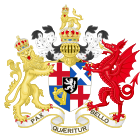Instrument of Government

|
|
| Long title | The Government of the Commonwealth of England, Scotland and Ireland and the Dominions thereunto belonging |
|---|---|
| Introduced by | John Lambert |
| Territorial extent | |
| Dates | |
| Royal assent | 15 December 1653 |
| Commencement | 16 December 1653 Installation of the Lord Protector |
| Repealed | 25 May 1657 |
| Other legislation | |
| Repealed by | Humble Petition and Advice |
|
Status: Repealed
|
|
The Instrument of Government was a constitution of the Commonwealth of England, Scotland and Ireland. Drafted by Major-General John Lambert in 1653, it was the first sovereign codified and written constitution in England.
The Instrument of Government included elements incorporated from an earlier document "Heads of Proposals", which had been agreed to by the Army Council in 1647, as set of propositions intended to be a basis for a constitutional settlement after King Charles I was defeated in the First English Civil War. Charles had rejected the propositions, but before the start of the Second Civil War the Grandees of the New Model Army had presented the Heads of Proposals as their alternative to the more radical Agreement of the People presented by the Agitators and their civilian supporters at the Putney Debates.
On 4 January 1649 the Rump Parliament declared "that the people are, under God, the original of all just power; that the Commons of England, being chosen by and representing the people, have the supreme power in this nation". This was used as the basis for the House of Commons to pass acts of parliament which did not have to be passed by the House of Lords or receive royal assent. Two days later the Rump alone passed the act creating the high court of justice that would try Charles as a traitor. Charles was tried and executed later that month.
On 17 March the Rump passed an act abolishing the monarchy and two days later an act abolishing the House of Lords. On 29 May 1649 the Rump passed . It was a simple declaration that Parliament would appoint "Officers and Ministers under them for the good of the People... without any King or House of Lords".
...
Wikipedia
